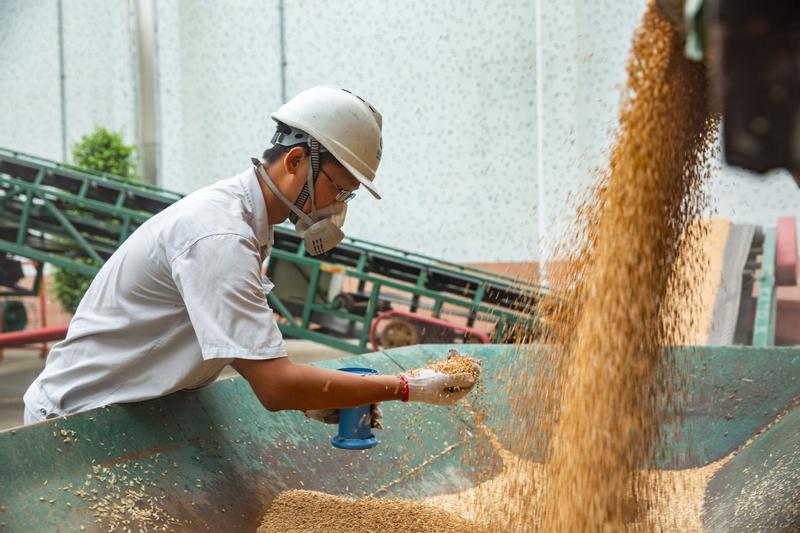 In this September 2020 file photo, a Sinograin employee checks quality of rice at the company's depot in Guangzhou, Guangdong province. (PHOTO PROVIDED TO CHINA DAILY)
In this September 2020 file photo, a Sinograin employee checks quality of rice at the company's depot in Guangzhou, Guangdong province. (PHOTO PROVIDED TO CHINA DAILY)
China Grain Reserves Group Ltd (Sinograin), the country's largest grain storage and transportation company, pledged to apply more digital technologies and enhance cross-industry cooperation during the 14th Five-Year Plan (2021-25) period to help ensure national food security, said its top executive.
China's summer grain output reached a historic high of 142.8 million tons this year despite the COVID-19 pandemic, said the National Bureau of Statistics
Deng Yiwu, chairman of the centrally-administered State-owned enterprise, said that thanks to support from a system of storage technologies targeting specific eco-regions and varieties of grains, smart technologies have already been applied to the company's business operations. It now runs the world's largest internet of things network in the global grain storage sector.
The company will continue to carry out standardized and technology-based warehousing management to guarantee the authenticity and high quality of all kinds of grain storage, Deng said.
ALSO READ: Going with the grain
The Beijing-based group currently operates more than 960 grain, oil and cotton storage facilities, with a combined storage capacity of nearly 100 million metric tons. Its warehousing facilities are made up of large house granaries, shallow bins, tower silos and various oil storage tankers, with main varieties of reserves including wheat, rice, corn, soybeans, cotton and edible oils.
Even though emergencies such as the COVID-19 pandemic have had an impact on the country's economic growth as well as changes in grain supply and demand in certain provinces, Sinograin has actively worked with grain processing companies across China to cumulatively put more than 100 million tons of grain and oil into the market, thus ensuring sufficient and reliable grain supply and helping stabilize food prices.
ALSO READ: China able to ensure food security despite coronavirus impact
"Strengthening scientific and technological innovation is an inevitable requirement for us to respond to the new situation of international competition and implementing an innovation-driven development strategy," he said, adding that it is an inevitable requirement for implementing the new national food security strategy, and promoting the transformation and upgrading of the grain industry.
Based on its role in implementing macroeconomic regulatory policy, Sinograin-supported by more than 40,000 employees and 30 subsidiaries-undertakes the tasks of grain and oil procurement, sales, allocation and storage.
Guided by government policies such as the country's first policy document of the year, the company ensures that: farmers can sell their grain at reasonable prices; domestic grain supply meets market demand; grain prices are basically stable, and farmers' economic interests and national grain security are guaranteed.
ALSO READ: China reaps bumper summer grain harvest in 2020
It also sells central grain and oil reserves that are nearing expiration dates, and purchases grain and oil up to certain quality standards in accordance with government plans each year.
In realizing food security, China will diversify import channels, increase imports of agricultural products that meet domestic demand and adjust and improve a minimum-purchase-price system for rice and wheat, according to a document
Eager to stabilize the agricultural sector and harness the role of rural areas, China's first policy document of the year contains scaled-up measures to ensure that the country can win the battle against poverty across the board as well as strengthen weak links in rural areas and certain agricultural production areas.
This is the 17th consecutive year in which the document-issued annually by the Communist Party of China Central Committee and the State Council-has focused on grain production and rural issues.
In realizing food security, China will diversify import channels, increase imports of agricultural products that meet domestic demand and adjust and improve a minimum-purchase-price system for rice and wheat, according to the document.
In addition to signing business contracts and cooperation agreements with the world's major agricultural goods traders-including United States-based Cargill Inc and France's Louis Dreyfus Co-to import soybeans in recent years, the company will continue to adapt to new international economic and trade conditions and actively adjust its source for imports of certain agricultural products, especially with markets taking part in the Belt and Road Initiative, Sinograin President Chi Jingtao said.
China's summer grain output reached a historic high of 142.8 million tons this year despite the COVID-19 pandemic, said the National Bureau of Statistics.
READ MORE: World food prices rise for fourth straight month
The bumper harvest laid a solid foundation for this year's food supply, which gives China strong confidence in its goal of building a moderately prosperous society in all respects and winning the battle against poverty, said Zheng Fengtian, a professor of rural development at Beijing-based Renmin University of China.


